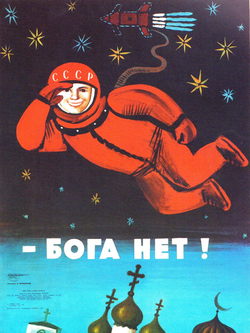More languages
More actions
(DPRK) Tag: Visual edit |
General-KJ (talk | contribs) No edit summary |
||
| (5 intermediate revisions by 2 users not shown) | |||
| Line 1: | Line 1: | ||
'''State atheism''' was adopted by [[Marxism–Leninism| | [[File:There Is No God.jpg|thumb|250px|A Soviet poster from 1975 of a cosmonaut soaring over religious houses of worship with the caption: "THERE IS NO GOD!"]] | ||
'''State atheism''' was adopted by [[Marxism–Leninism|Marxist–Leninist]] [[Socialist state|socialist states]] throughout the 20th century. It started in the [[Union of Soviet Socialist Republics|Soviet Union]] as a response to the [[theocracy]] of the Russian Orthodox Church under the tsar and was meant to promote a more secular and atheistic society. Other Marxist-Leninist states (such as [[Republic of Cuba|Cuba]] and [[People's Socialist Republic of Albania (1946–1992)|Albania]]) adopted this line in the 20th century, but today the concept is controversial among many Marxist–Leninists, who felt it unfairly targeted various religious groups. State atheism is still practiced in [[People's Republic of China|China]], [[Socialist Republic of Vietnam|Vietnam]] and the [[Democratic People's Republic of Korea|DPRK]], although religion is not repressed in these countries. | |||
Korean leaders [[Kim Il-sung]] and [[Kim Jong-il]] popularized the phrase "The people are my God" as a [[Democracy|democratic]] and people-centered alternative to a state religion.<ref>{{Citation|author=14th [[Supreme People's Assembly]]|year=2019|title=Socialist Constitution of the Democratic People's Republic of Korea|chapter=Preamble|chapter-url=https://en.wikisource.org/wiki/Socialist_Constitution_of_the_Democratic_People%27s_Republic_of_Korea_(2019)#PREAMBLE}}</ref> | |||
== References == | == References == | ||
[[Category:Atheism]] | |||
Latest revision as of 19:14, 22 November 2024

State atheism was adopted by Marxist–Leninist socialist states throughout the 20th century. It started in the Soviet Union as a response to the theocracy of the Russian Orthodox Church under the tsar and was meant to promote a more secular and atheistic society. Other Marxist-Leninist states (such as Cuba and Albania) adopted this line in the 20th century, but today the concept is controversial among many Marxist–Leninists, who felt it unfairly targeted various religious groups. State atheism is still practiced in China, Vietnam and the DPRK, although religion is not repressed in these countries.
Korean leaders Kim Il-sung and Kim Jong-il popularized the phrase "The people are my God" as a democratic and people-centered alternative to a state religion.[1]
